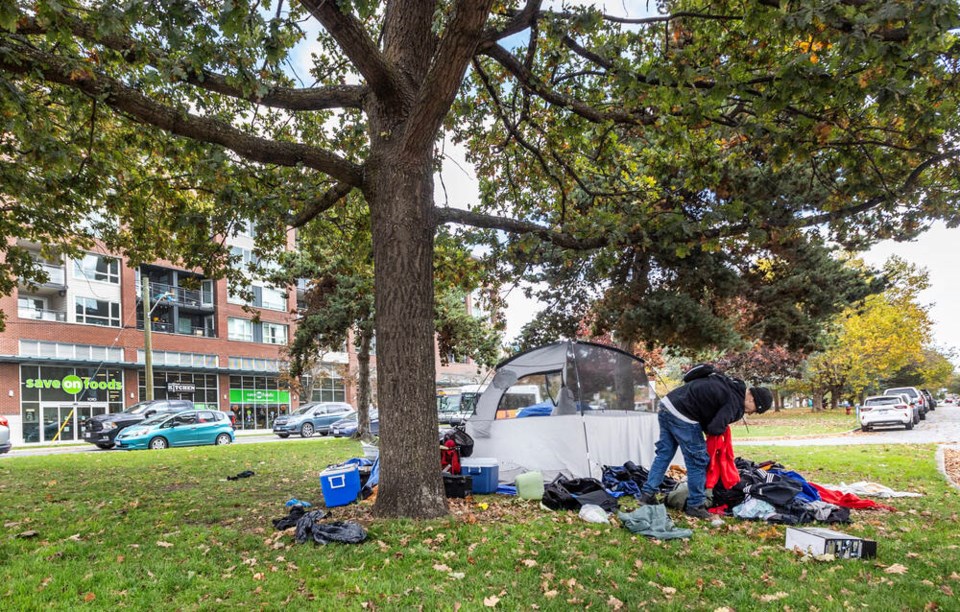A commentary by a Victoria council member and Capital Regional District director.
I often hear questions like “When will sheltering in parks come to an end?” and “What are you doing about homelessness?”
These are good questions, and here are some answers.
Interim actions:
Victoria is moving forward on homelessness and sheltering in public places. The city has a couple of new actions underway as well as ongoing work.
First, though, it’s clear that homelessness and related issues – including the housing shortage, poverty, addictions, untreated mental illness and brain injuries – are provincial responsibilities.
These problems have been downloaded onto cities since the 1980s, but cities don’t have legal authority or financial capacity to resolve them.
The provincial government recently acknowledged its responsibility to address these issues in a document called Belonging in B.C., the government’s cross-ministry, comprehensive homelessness plan.
B.C. has begun to ramp up that plan. This year it opened new affordable housing and supportive housing (housing with supports for residents) in this region.
Many who were sheltering outdoors – and in cars, on couches and elsewhere – have been housed. The government also announced funding for mental health and addictions treatment facilities, as well as judicial system improvements to deal with the criminals who prey on the unhoused and others.
I’m relieved to see this after decades of little to no provincial movement on these issues. Still, Victoria residents and businesses say the situation is dire, and more urgent action is needed. That’s a fair comment.
So Victoria council has stepped in – reluctantly and temporarily – with interim actions to address some immediate needs.
Relocation coordinator:
This year, council funded a parks relocation coordinator to engage with unhoused people, understand their individual needs, and match them with suitable shelters, housing and supports.
This service has been operated by Pacifica Housing – one of several service organizations in this region with a solid track record. Pacifica is doing a great job; several people have been housed, and council has extended the relocation service funding.
However, most people sheltering are not in parks. So council supported my recent motion to expand the work of the relocation coordinator to include parks, streets, boulevards and other public places, and to look more carefully at sheltering locations.
Sheltering locations:
As people have moved from parks into better shelters and homes, council has expanded the number of parks on the city’s no-sheltering list. More than 20 Victoria parks are on the list.
As the number of parks where sheltering is still allowed shrinks, there is a growing need for more careful analysis. The courts have ruled that cities can’t prohibit sheltering in all parks unless there are suitable alternatives for the unhoused.
So the city needs to look even more closely at capacity, locations, and other factors to ensure we are legally compliant and treating people humanely. My motion asked city staff to report back with an analysis on locations, and after that report arrives council will consider further decisions.
The no-sheltering list will continue to evolve, guided by the analysis. Some parks may be added, some may be removed. Everyone hopes to see more people connected with better sheltering and housing options, allowing the no-sheltering list to grow.
Ongoing city work:
The city continues its work of managing day-to-day problems.
Our bylaw services team, which has more than doubled in size in recent years, works to enforce the no-sheltering parks list, and keep sidewalks passable.
The police deter violence and investigate crimes (the unhoused are probably the biggest victims). The police budget was increased by more than $4.5 million last year – the second-biggest increase (after the 2022 increase) in the past 17 years, and perhaps ever.
Yet more needs to be done. And everyone knows we can’t end homelessness, or sheltering in parks and other public places, by just managing the symptoms. Moving people from place to place is not a solution.
So it’s encouraging to see the province moving forward with permanent housing, supports, and solutions to the deeper problems. In the meantime, the city’s interim actions are starting to pay off.
Still, miles to go before we sleep…


